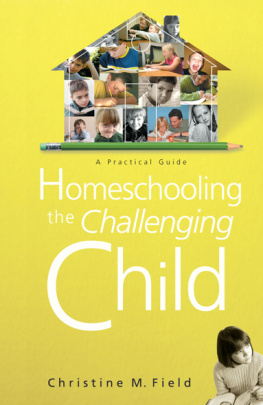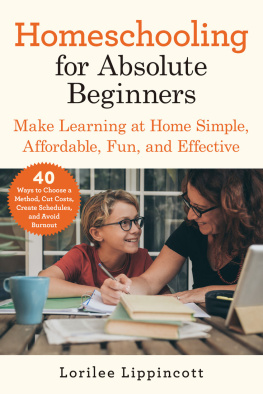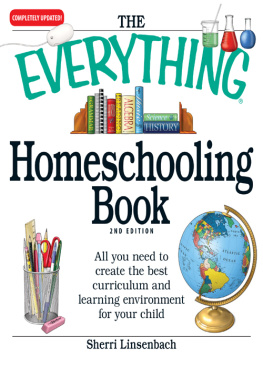
Homeschooling 101: A guideto getting started.
By Erica Arndt
Copyright 2013 Erica Made Designs, LLC
All rights reserved.
Book, Cover Design & Graphics by: Erica MadeDesigns, LLC
No part of this publication may be reproduced,distributed, or transmitted in any form or by any means, includingphotocopying, recording, or other electronic or mechanical methods, without theprior written permission of the publisher, except in the case of briefquotations embodied in critical reviews and certain other noncommercial usespermitted by copyright law.
For permission requests, email the publisher,addressed Attention: Permission Coordinator, at the address below.
Additional works by this author are available at www.confessionsofahomeschooler.com
Printed in the United States of America.
This book is dedicated to all of thebeloved
homeschooling parents who havecommitted their
lives to educating their children athome.
Thank you to all of my readers foryour constant support.
Without you, Confessions of aHomeschooler would not exist!
And a special thank you to my mom andeditor, for a
lifetime of support, and for takingthe time to read every last word.
Disclaimer:
I am not a legal attorney, nor do Ihave a degree in law.
The information contained in this Bookis what I have gleaned from my own research
and should not be taken as legaladvice. If you have any questions regarding
homeschooling, please refer to thelaws in accordance with your own state,
or seek professional legal counsel.
This book may contain affiliate linksfrom which I benefit directly.
Table of Contents
Chapter 1: You've Decided to Homeschool... Now What?
Chapter 2: Choosing Curriculum
Chapter 3: Gathering Curriculum
Chapter 4: Creating Effective Lesson Plans
Chapter 5: Getting Organized
Chapter 6: Starting School - Day 1
Chapter 7: Homeschooling Multiple Grades
Chapter 8: Homeschooling & Discipline
Chapter 9: Standardized Testing
Chapter 10: Homeschooling with Toddlers
Chapter 11: Homeschooling Your Preschooler
Chapter 12: Homeschooling Kindergarten &Elementary
Chapter 13: Homeschooling Jr. & High School
Chapter 14: Homeschooling on a Budget
Chapter 15: Starting Homeschool Midyear
Chapter 16: Switching Curriculum Midyear
Chapter 17: Homeschooling an Only Child
Chapter 18: Homeschooling & the Working Parent
Chapter 19: Homeschooling & Special Needs
Chapter 20: What about Socialization?
Chapter 21: Time Management & Keeping your Sanity
Chapter 22: Homeschool Burnout
Chapter 23: Staying the Course & Naysayers
Appendix (Homeschool Forms)
Resources & Links

Soyouve finally decided to homeschoolbut have no clue where to get started?Just the mere thought of homeschooling can be a very daunting task. Delvinginto the unknown can also create an element of self-doubt that fills your mindright off the bat. That coupled with an overwhelming task of choosing andgathering curriculum, creating lesson plans, organizing supplies, and teachingmultiple grade levels can be quite disheartening.
But dont worry, in this book it is my intentionto offer you a step by step practical guide that will help you to get startedand continue on in your homeschooling journey. I will help guide you throughall of the steps to getting started, choosing and gathering curriculum,creating effective lesson plans, scheduling your day, organizing your home,staying the course, and more!
As you may have heard already, there is no oneright way to homeschool. This book is by no means a rigid set of rules thatmust be followed exactly. Instead it is a tool to provide you with the means toget started in your journey. Take from it what makes sense for your family, andalter that which needs to be changed to fit the unique needs of yourhomeschool.
So lets get started shall we?
1. Get a Vision !
Thebest way to begin your homeschooling journey is to start with the basics. FirstI suggest that you start off by creating a vision for your homeschoolingjourney. I think you will find you have all of the tools necessary to guide youthrough this journey if you seek Gods will for your homeschool, and take sometime to pray for direction.
Bycreating a vision statement for why you are homeschooling, youll have abackbone to fall upon when doubt and indecision creep in. In the HomeschoolingVision Worksheet (See Appendix) you will define your homeschooling goals, what youare striving towards, and why you are choosing to homeschool. Once youve laidthis foundation you will be more prepared for the trials that will follow.
2. Why are you homeschooling?
Beginningwith basics, ask yourself this questionwhy are you homeschooling? Is thissomething you feel called to do, or are there other reasons motivating youtowards this journey? Taking some time to list the reasons for your choice tohomeschool is a great way to solidify your decision. Writing it down will alsohelp remind you why you chose this direction and help get you back on track ifyou start to lose focus or get discouraged.
Ihighly encourage you to write down your reasons for choosing to homeschool andkeep it somewhere handy so you can refer back to it whenever you find yourselfdoubting your decision.
Didwe make the right choice?
ShouldI have put my children in school?
AmI teaching my children enough?
Arethey missing something by being taught at home?
Unfortunatelyone of the biggest issues homeschoolers can face is the indecision and doubtfactor. Of course we all want what is best for our childrens education, and ifthings arent going as expected we need a reminder of why we chose this path tostart with. Knowing what the goals for our homeschool are, we can adjust whatwere doing so were moving toward those goals and not toward what someone elsetells us we should be doing.
3. Know your state laws.
Whileyou dont have to be a lawyer to homeschool, you will at the very least need abasic knowledge of your state laws and requirements for homeschooling. Eachstate is different, so youll want to make sure that you are following yourspecific state requirements.
Thebest place to learn about your states homeschooling laws is by visiting theHomeschool Legal Defense Association ( www.hslda.org ). They havecurrent homeschooling information, laws, and general information on gettingstarted as well.
Someof the things youll want to find out:
Atwhat age is a student required to start formal school?
Whatare the requirements for attendance? (i.e. How many days per year are yourequired to do school.)
Whatis the amount of hours required per year?
Whatkind of records do I have to keep each year?
Whatsubjects do I have to teach?
Isthere a certain curriculum required?
Whatrequirements or qualifications must I have to teach my children at home?
Whatis the age of attendance? (Most states require school attendance by 6 yearsof age, but again states may vary.)
Next page









